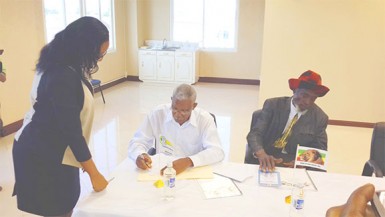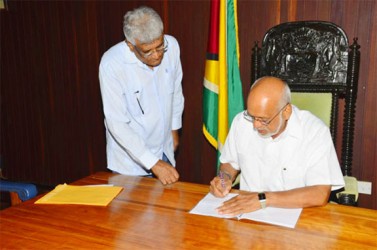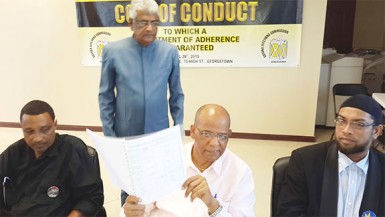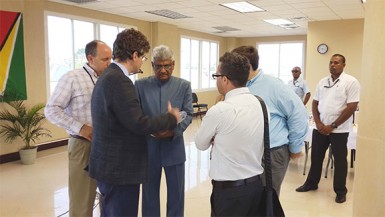The long awaited Code of Conduct for Political Parties was signed yesterday at the Guyana Election Commission’s Command Centre with Chairman Dr Steve Surujbally stating that adherence to the code will bring peace and order.
“Adherence to the code elevates all concerned to a moral high ground away from the currently deteriorating thrust and parry of political campaigning…,” Surujbally said.
He emphasised that the parties must not take signing onto the Code of Conduct lightly as “decency does not have an expiry date.”

Critics have lamented the length of time it took for the code to be signed considering that the elections are just over a week away and many offending statements have already been made on the campaign trail.
Surujbally said, “Statements made at news conferences and on roadside platforms should be to edify and inform not to numb, mystify and create doubt and social unrest.”

The Chairman hinted that grandstanding and pomp by parties had no place in the election season. Surujbally called on the parties to abide by the code because “Gecom must not be placed in a position of trying to manage and produce credible elections in an environment of hostility and turbulence, calculated coarseness and unnecessary vulgarity and ad hominem attacks.”
He said that those who aspire to manage the affairs of Guyana for the next five years should be prepared to endorse the contents of the all-encompassing code.
Gecom’s chairman stated that the parties cannot in good faith speak about development while speaking in half-truths creating animosity.
“This code must not be weakened by distrust, or thrown into the dustbin by this evening. It must not be discarded because of petulance, vexation, petty discontent, manufactured resentment and theatrical posturing,” Surujbally told party

representatives prior to the signing ceremony.
The signing commenced with APNU+AFC Coalition presidential candidate David Granger placing his signature on the document first. President Donald Ramotar had signed on to the code earlier in the day at the Office of the President. However the PPP’s General Secretary Clement Rohee was at the signing ceremony showcasing the party’s support of the code.
Rohee did not take any questions from the media and quickly exited the building while Granger spoke to journalists about his party continuing to take the “high road.”
Granger said, “We have already instructed our supporters not to interfere…, not to even go to any political meetings if they feel like they will be offended by what is said of other parties, not to tamper with their election equipment and not to get involved in any disorder involving persons of other political parties.”

He challenged the PPP’s intentions, stating, “This is an explosive document. I am surprised the PPP is here.”
He read from the document highlighting Section I (iv) which states that parties will “ensure slogans, posters, handbills and other forms of advertisements do not contain material offending public morality, decorum and decency via taunts, ridicule, innuendo or defamatory matter.”
Granger said, “Can you imagine Mr Rohee signing this? And then what? [glancing at the code for reference] Forbid the publication of any pamphlet, cartoon or any material containing texts that could offend or incite people or cause public disorder? We have already had to write one newspaper calling for the retraction of a cartoon issued by the People’s Progressive Party.”
The APNU+AFC Coalition candidate said, “You will see a compliance with this code. We are very serious about it… We have no interest in violence we have nothing to gain from violence.”
He added, “…Our party further denounces the violation of anyone, because of that person’s political allegiance…”
He said he hoped to see “true compliance” now that the code has been signed.
The event was attended by the ABCE (America, Britain, Canada and EU) Heads of Mission as well as observers from several non-governmental organizations. Generally expressed was the hope that the campaigning by the parties will be respectful and stay away from divisiveness while adhering to the code.
Platform presentations by former President Bharrat Jagdeo have come in for strong criticism over race divisiveness and allegations against military personnel. Jagdeo has been rapped by the Media Monitoring Unit of Gecom over his March 8 presentation at Port Mourant for race divisiveness,
Under the heading `A peaceful campaign and respect for others’, the code forbids the use of abusive, slanderous or threatening language which could incite people of one group to violence against any candidate, agent or supporter.
It also prohibits the publication of any pamphlet, poster, cartoon or other material with text which could offend or incite people to public disorder. It also forbids candidates, agents or supporters from engaging in personal attacks and defamatory comments relative to opposing candidates and their families.





